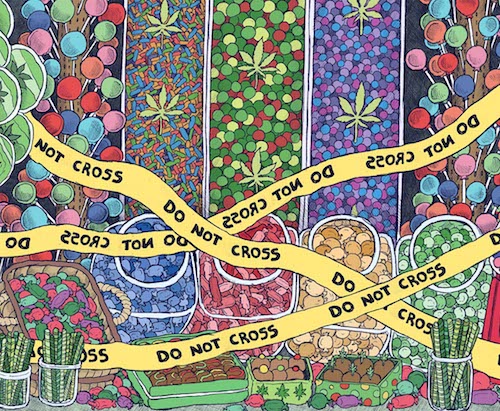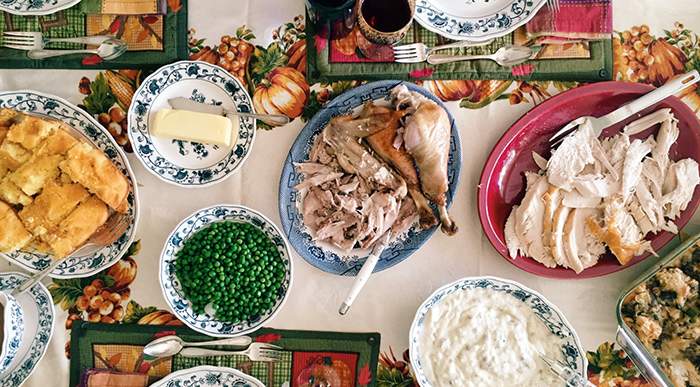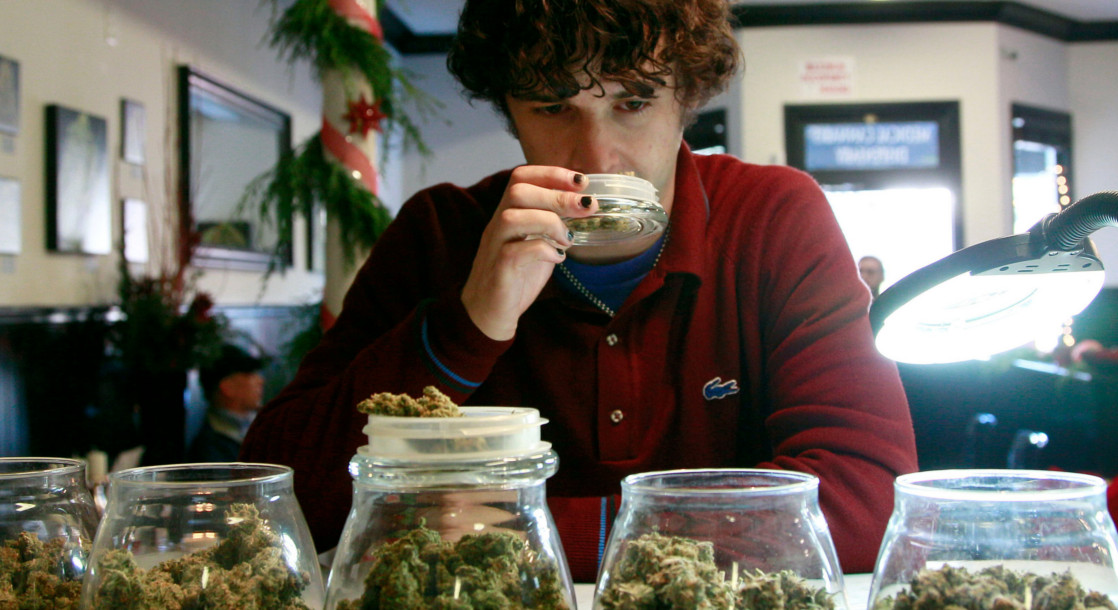With less than six months until cannabis officially becomes legal in the state of California, members of the previously underground, autonomous weed economy are bracing themselves for a wave of regulations from the Manufactured Cannabis Safety Branch of the California Department of Public Health. While various elements of the legal cannabis industry––such as lab testing, which helps consumers know exactly what's in their cannabis––deserve stronger regulatory oversight, the FDA won't moderate weed while it remains federally illegal. A number of measures, including dosage caps, prohibited ingredients, and package restrictions, pose a serious threat to the way edible manufacturers do business.
Come January 1, the proposed legislation in place would threaten, if not destroy, the diverse array of treats we've grown accustomed to. If passed, edibles would be capped to ten milligrams per serving––roughly the equivalent of a few hits of a joint––and imaginative cannabis chefs would be restricted from incorporating ingredients such as fruit extracts and dairy into their recipes. When you factor in a bongload of proposed restrictions on packaging and branding, these new regulations might severely limit the care options of patients rely on edibles to help manage serious medical issues. To explore the issues facing this community, we spoke with a number of key players about the current situation, and how best to regulate safe edible practices without obliterating their world as we know it.
"For the past 20 years we've had an unregulated medical marijuana market that, in many ways, has failed patients and business owners," says Rob Roshenheck, founder of the popular edibles and topical brand Lord Jones. To Roshenheck, regulations at their best would curtail practices that prioritize profit over patient safety, cut down on illegal dispensaries, and bar the police from raiding lawful businesses. He believes a regulated market is "essential" for California if it wants to "take its rightful place as the worldwide leader of the cannabis movement, to provide safety for consumers as well as certainty for operators."
Doug Dracup, founder of Southern California Cannabis fest Chalice Cup and owner of Hitman Glass, says that the use of pesticides on cannabis crops is in particular need of regulation. He explains, "Leading up to this point, the majority of edibles were made in residential kitchens, which is still a big problem. But the next, bigger issue, is the cleanliness of the distillate and the hash that's going into them. Most people running a profitable business are going to look for the cheapest product for the biggest profit. A lot of people run under a guise, when they're really just consciously poisoning people with stuff that costs them two dollars." In 2015, Colorado experienced a massive recall, pulling nearly 30,000 edible products off the shelves after finding pesticide levels unsafe for human consumption. Since then, the presence of pesticides in edibles has been a huge issue in the cannabis community, one California's desperate to address before January 1st.
"There are also a lot of people who really care about what they're doing," continues Dracup. "But a lot of people are unconsciously poisoning people too, so you can't always blame them. Personally, I barely eat any edibles. I don't even smoke other people's hash unless it's tested. You just never know nowadays."
In the hopes of addressing potentially serious problems, lawmakers seem to have overcorrected. Rather than focusing on the harmful issues at hand, lawmakers and lobbyists have taken to implementing strict and unnecessary rules, indicating a fear of the unknown rather than the ability to safely mediate the industry into regulation.
100 MG THC DOSAGE CAPS
Dosage caps are one of the most worrisome of the impending regulations. For those dealing with high pain, like cancer patients or veterans struggling with PTSD, the amount of THC that would send you or I into a psychedelic stupor can be necessary just to cope with a patient's symptoms. The proposed cap of 100 mg THC per package, and 10 mg per serving, would be incredibly detrimental to the people who need it the most.
"The state needs to acknowledge and recognize that marijuana is interesting based on the fact that it affects everybody very differently. Therefore, there isn't one dose that works for everybody," says Chris Coggan, CEO of the cannabis drink company Therapy Tonics and Provisions, and co-author of the petition to revise these regulations.
"It doesn't really make any sense to me personally that they would just try to pick that number out of thin air and say this is the number and you can't go above it," says Adam Spiker, Executive Director of the Southern California Coalition for Creating Responsible Marijuana Policy. "There are folks who experience chronic pain, and I would argue that if taking higher doses of cannabis is an alternative to taking these heavy, addictive opiates, that should absolutely be allowed."
PROHIBITED INGREDIENTS
Under current legislation, juices or extracts from fruits and vegetables, all dairy products, and anything that needs refrigeration would be banned. In their stead would see a host of preservatives and synthetic materials, which in addition to presenting their own set of health risks, directly contradicts the organic ethos California so proudly touts.
"This state leads the nation in the movement towards farm to table organic food, explains Coggan. "People in California rely on fruits, vegetables, things they know aren't full of preservatives. For the state to regulate edibles in a different way than that is pretty hypocritical. They're selling the California lifestyle that these regulations are the antithesis of. It's problematic."
CHILDPROOF PACKAGING AND BRANDING RESTRICTIONS
While proposed resealable, opaque, and childproof packaging restrictions would indeed make it harder for your rowdy teenage son to dip his hand into the pot cookie jar, difficult-to-open packaging could also hamper a high-pain patient's ability to physically access their medicine. Additionally, such packaging is non-biodegradeable, presenting an environmental risk to boot.
There's also legislation gaining traction in Sacramento (SB 162) that would completely take away the opportunity for companies to brand and advertise their products, presenting a serious concern to the personality-driven world of pot commerce. The Southern California Coalition's Spiker says, "Manufacturers go above and beyond as edible companies in how they brand and advertise their products." If passed, Spiker adds, the legislation would tie the industry's hands in unique and restrictive ways. "For example, giving away samples. Pharmaceutical reps can give away samples to sell their product. Cannabis businesses [wouldn't be able to]. It makes no sense."
WHO IS BEHIND THESE REGULATIONS?
Marijuana is a tricky substance to regulate, in part because it can be used both recreationally and for legitimate medical purposes. This places it squarely in the sights of lobbyists from the pharmaceutical and tobacco industries––both of whom risk losing a market share to legal weed––who may be placing pressure on already uninformed lawmakers just trying to do the right thing.
According to a representative from the California Department of Public Health (CDPH), "The California Department of Public Health is working to balance the requirements of the law, including provisions that were approved by the voters last November, with business needs of the industry, consumer desires, and the Department's mandate to protect public health and safety. In addition to state laws, tobacco and alcohol also have to comply with federal laws and regulations and are subject to an entirely different set of regulations, oversight, and enforcement than cannabis."
For his part, Chris Coggan of Therapy Tonics believes something sinister may be afoot. "Tobacco and big pharma are worried that cannabis combustibles, edibles, everything, are going to replace a huge portion of their market. Their public response to these regulations is to say that they're way too lenient and that the dosage is way too high. If you think about the bigger picture, yes the cannabis industry will be a $5 billion dollar industry by 2020 in California, but in getting from here to there, we have to fight some of the biggest national companies on the planet."
Kristy Knoblich, founder of edibles giant Kiva Confections, attributes the pedantic regs to outsiders' inability to grasp the industry. "I think it's because regulators and lawmakers don't understand cannabis," she says. "We're pretty transparent with our operation, and we lead tours at every opportunity. We get regulators in here, and at first, they're usually very uptight. They don't know what to expect, what they're about to see, or what environment they're in. By the end of the tour, it's night and day. You can visibly see the comfort, they're making jokes about taking home samples, stuff like that. They just have no concept that our operation could be professional, that it's full of industry experts and experts from other industries. I don't think they see the level of discipline. They picture the worst case scenario, like a drug den or a meth lab."
COMPROMISE AND SHARED ACCOUNTABILITY
As it stands now, the industry is stuck waiting on a revised set of regulations to be released by the state in response to questions raised by the public comment period that recently ended. Chris Coggan's Therapy Tonics has introduced a petition in favor of, "practical, effective regulation that will encourage innovation and ensure that you as patients retain safe, affordable access to your favorite infused products." So far, it's garnered hundreds of signatures, with a number of endorsements from heavy hitters like NORML, Kiva, and Korova Edibles.
"The petition itself was about the public saying hey, these manufacturers know what they're doing," explains Coggan. "We sent in some suggested solutions that are more practical. During this waiting period, the petition goes on. Ultimately we want to continue to gather endorsements as well as signatures."
Adds Spiker, "I think we need to be extra careful and mindful of the fact that cannabis is still a Schedule I narcotic. It's a shame, but it's the landscape we have to negotiate in as an industry. The more organized we are, the more successful the industry will be in convincing legislators that we deserve the responsibility to have our suggestions properly considered, and work from there."
It seems that while regulations on the production of edibles––and all marijuana products––are badly needed, California's proposed solutions to the unique issues of legal weed are off the mark. Given the health of both an entire industry and the patients it serves is on the line, here's to hoping that those on each side of the debate are open to negotiation.











